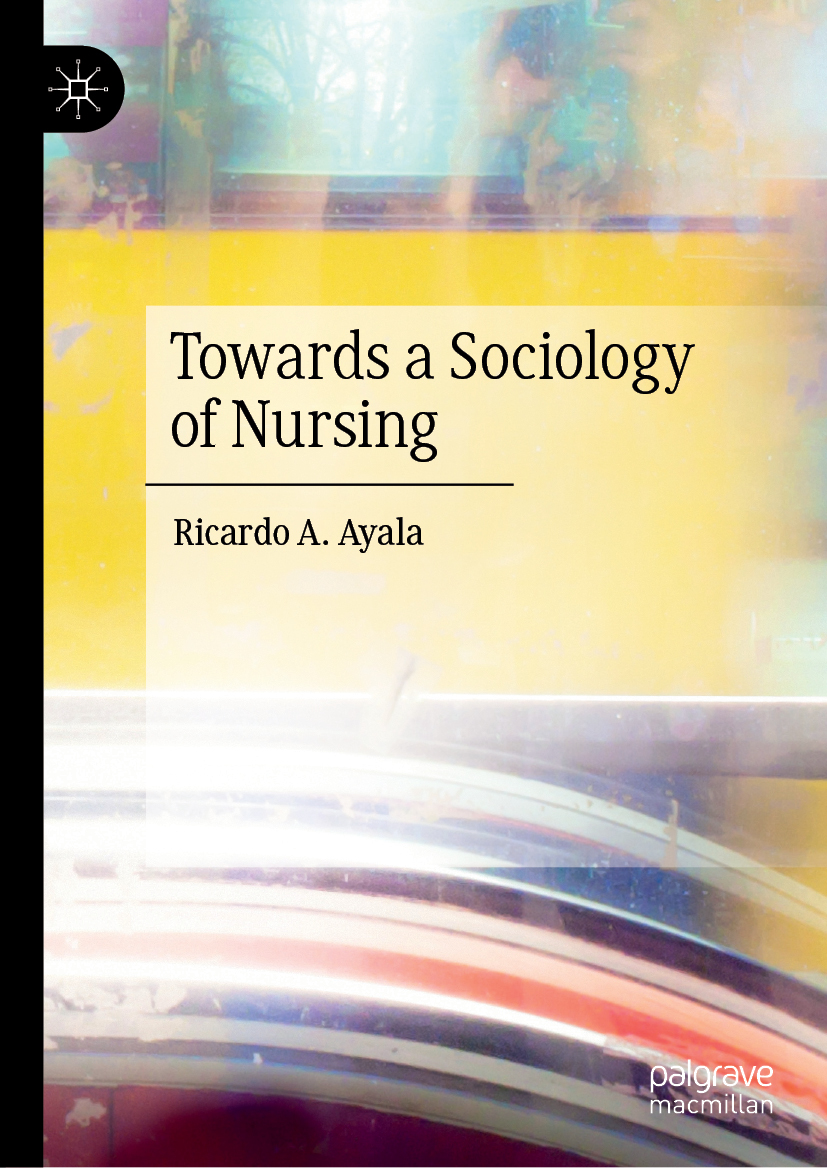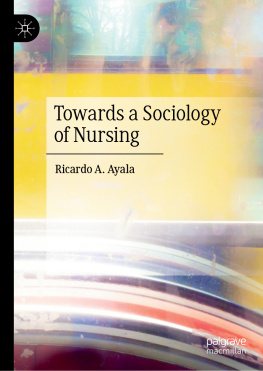Ricardo A. Ayala - Towards a Sociology of Nursing
Here you can read online Ricardo A. Ayala - Towards a Sociology of Nursing full text of the book (entire story) in english for free. Download pdf and epub, get meaning, cover and reviews about this ebook. year: 2020, publisher: Palgrave Macmillan, genre: Politics. Description of the work, (preface) as well as reviews are available. Best literature library LitArk.com created for fans of good reading and offers a wide selection of genres:
Romance novel
Science fiction
Adventure
Detective
Science
History
Home and family
Prose
Art
Politics
Computer
Non-fiction
Religion
Business
Children
Humor
Choose a favorite category and find really read worthwhile books. Enjoy immersion in the world of imagination, feel the emotions of the characters or learn something new for yourself, make an fascinating discovery.
- Book:Towards a Sociology of Nursing
- Author:
- Publisher:Palgrave Macmillan
- Genre:
- Year:2020
- Rating:5 / 5
- Favourites:Add to favourites
- Your mark:
- 100
- 1
- 2
- 3
- 4
- 5
Towards a Sociology of Nursing: summary, description and annotation
We offer to read an annotation, description, summary or preface (depends on what the author of the book "Towards a Sociology of Nursing" wrote himself). If you haven't found the necessary information about the book — write in the comments, we will try to find it.
Towards a Sociology of Nursing — read online for free the complete book (whole text) full work
Below is the text of the book, divided by pages. System saving the place of the last page read, allows you to conveniently read the book "Towards a Sociology of Nursing" online for free, without having to search again every time where you left off. Put a bookmark, and you can go to the page where you finished reading at any time.
Font size:
Interval:
Bookmark:


Cover credit: Alex Linch shutterstock.com
This Palgrave Macmillan imprint is published by the registered company Springer Nature Singapore Pte Ltd.
The registered company address is: 152 Beach Road, #21-01/04 Gateway East, Singapore 189721, Singapore
Nursing is often studied as a single entity as if nursing were a single issue untouched by culture, geography and political economy. In fact, it is embedded in the social relations and constructed within different socio-cultural and historical contexts. The body of work presented in this book is formidable and inspiring in its depth and breath. I see the author as uniquely able to contribute to the disciplines of sociology and nursing.
Professor Karen Breda, University of Hartford, USA
Ricardo Ayala does a remarkable analysis of nursings professionalization. By using the Chilean example, he takes us on a historical and sociological journey that helps us to understand the progress (and sometimes difficulties) nurses around the world have faced while constructing their social image. This book is a must-read for those keen to learn more about the sociology of nursing and also a great methodological input for systematically exploring the sociology of professions.
Professor Paulina Bravo, Catholic University of Chile School of Nursing, Chile
Dr. Ayalas book traces the origins and continuum of the nursing profession throughout history as a powerful force on the health, well-being and shape of society. His book provides a useful sociological compass for navigating through the realm of professional and societal issues reflected in nursing. Ayala skillfully explores how nursing transitioned to academia, investigates the cultural schisms between nursing and midwifery and scopes the impact of the profession on modern healthcare. He offers an excellent contemporaneous and timely analysis to the gendered nuances of nursing which is much needed in an age searching for equity and equality between the sexes. Ayalas multi-faceted text appeals to the reader who willingly thinks and reflects about the minutiae, complexity and conceptuality of issues that can influence nursing practice. This book will be valued among those with an inquisitive mind and an appreciation of the rich sociological vein of interest nursing provides. I expect that lay, professional and research-mind people will find this book enriching as it adopts an accessible prose which provides intellectual nutrition that is easily digested by all types of readers.
Professor Nicholas Ralph, University of Southern Queensland, Australia
Profession
Generally, a profession is a knowledge-based category of occupation which usually follows a period of tertiary education and vocational training and experience; at least in part, that knowledge comes from science. Professions are also structural, occupational and institutional arrangements for work associated with the uncertainties of modern life in risk societies.
Although distinguishing the professions from other, less complex forms of work is difficult today, oftentimes professional groups either are elites with strong political links and connections or use elites political mechanisms of market closure and occupational control. The focus of sociological interest lies precisely in the exclusionary devices that professionalisation encourages.
Para-Profession
Arising in the late 1960s, the term para-profession (or semi-profession) refers to aspiring occupations that evolve into the status of established professions, but are characterised primarily by their shortcomings. Beneath this notion lies the mystification and stigmatisation of gendered patterns of the division of laboursuch as nursing, teaching, social work and librarianshipwhich presupposes that all professions share the same value orientation.
Professionalism
Professionalism is used to denote an array of traits such as reliability and trustworthiness, which is expected to arise from the relationship with users. It is common that for professionals to be successful they have access to users confidential or sensitive information, while users need the insurance that such knowledge will not be used for fraudulent purposes. This is why mutual trust is key to professionalism.
Social Theory
Theory is an assembly of statements of why and how ideas or facts are interrelated. Social theory uses different broad-ranging frames to formulate theory, focusing, for example, on social structure (fairly stable behavioural patterns), social functions (roles which are regarded as essential to the operation of society as a whole), social conflict (a frame that regards society as an arena in which some groups are benefitted while others are deprived) and symbolic interactions (an approach that sees society a the result of peoples everyday interactions).
Most of this books contents analyse overt behaviour, struggles and purposeful interaction between social groups, thus using a social conflict stance.
Social Stratification
This is a system of social organisation based on ladders hierarchically organised. Stratification transcends individuals and persists across generations and societies. Some societies are stratified by casteswhere destiny is defined by birthwhile others are stratified by classeswhere ones position in the hierarchy is rather defined by the dynamics of the economy.
Social Class
Class, as used in this book, is a rung in the social ladder defined on the basis of income, material wealth and lifestyle. Different traditions and agendas of class analysis may lead to different emphasismaterial or symbolic. Class coexists with other forms of stratification, such as gender, ethnicity, sexual orientation and citizenship.
Font size:
Interval:
Bookmark:
Similar books «Towards a Sociology of Nursing»
Look at similar books to Towards a Sociology of Nursing. We have selected literature similar in name and meaning in the hope of providing readers with more options to find new, interesting, not yet read works.
Discussion, reviews of the book Towards a Sociology of Nursing and just readers' own opinions. Leave your comments, write what you think about the work, its meaning or the main characters. Specify what exactly you liked and what you didn't like, and why you think so.









